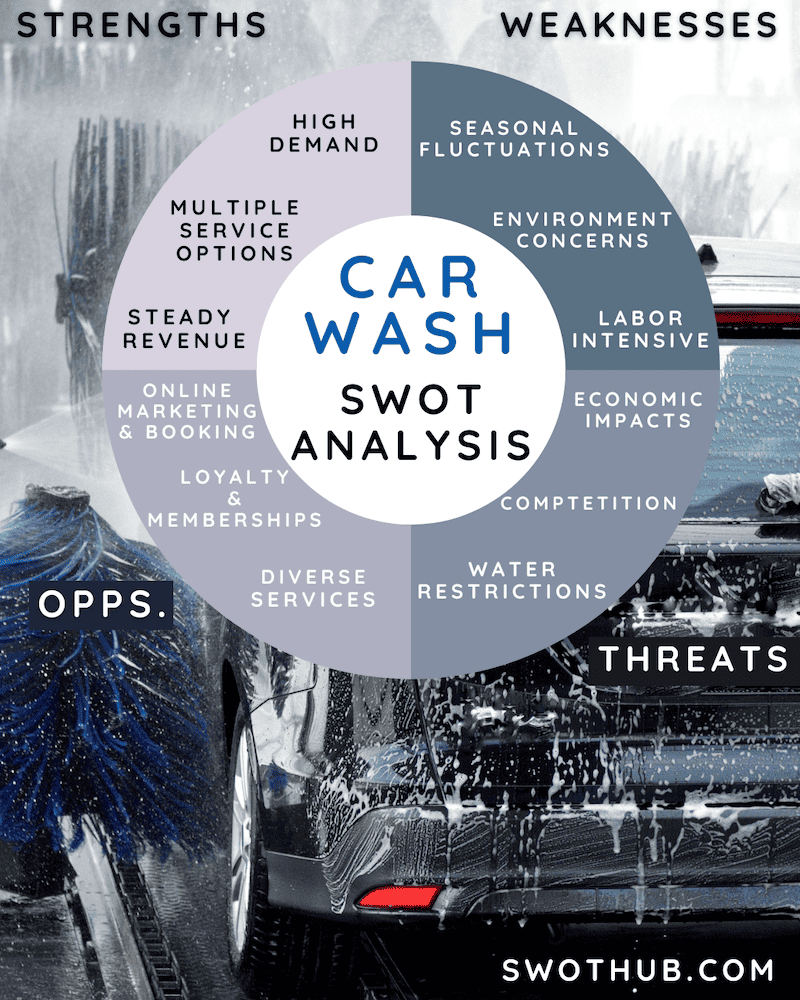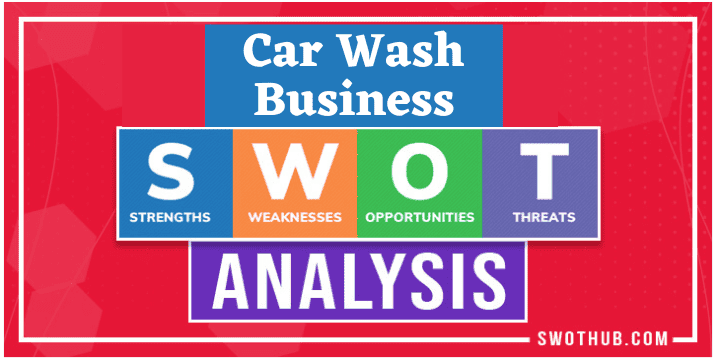The car wash industry has emerged as a resilient and lucrative business model, catering to the constant demand for vehicle maintenance and hygiene. In a car wash SWOT analysis of the car washing industry, we examine its strengths, weaknesses, opportunities, and threats. In addition, we will examine some profitable car wash companies in the United States that have utilized the car wash industry model to achieve profitability and sustained growth.
Table of Contents
Car Wash SWOT Analysis
What are the advantages of the car wash business?
Profitability-wise, a car wash business provides a number of benefits that make it an attractive business opportunity. These benefits contribute to the possibility of dependable revenue streams and long-term profitability. Let’s examine a few of the most important benefits of a car wash SWOT analysis.
Car Wash SWOT Analysis Strengths:
The areas where an industry excels above average or in a manner that distinguishes it from its rivals are its strengths. In a swot analysis of a car wash business, some of its strengths compared to competitors include the car industry‘s assets, which stem from its inherent appeal to a broad customer base, as it provides convenience, time-saving solutions, and a variety of services.
High Demand and Steady Revenue Streams: The car wash industry enjoys a consistent demand because vehicles require regular cleansing and maintenance. Whether it’s a quick exterior wash or a thorough detailing service, car owners recognize the importance of keeping their vehicles clean, ensuring a steady revenue stream for car wash businesses. Even during economic downturns, people tend to place a high value on the hygiene of their vehicles, making this industry relatively recession-resistant.
The car wash industry has low entry barriers. In comparison to many other businesses, establishing a car wash requires a low initial investment and specialized technical knowledge. This attracts entrepreneurs and small business proprietors who are interested in profitable ventures with manageable risks.
Multiple Service Options: Businesses that offer car washes have the flexibility to offer a variety of service options, allowing them to cater to the preferences and budgets of various customers. Car washers can accommodate a variety of customers by providing self-service options, automated drive-through systems, and premium detailing services.
Convenience and Saving Time: In a car wash SWOT analysis, car washes are a convenient option for car owners who lack the time, apparatus, or desire to clean their own vehicles. Automatic car washes, in particular, offer rapid and hassle-free services, attracting busy people who value expediency and comfort.

Car Wash SWOT Analysis Weaknesses:
Although the car wash industry offers numerous benefits, it is not without flaws. With meticulous planning and business strategies, these weaknesses can be overcome. In this SWOT analysis, let us look at the disadvantages of a car wash business.
Car Washes Face Seasonal Fluctuations: Many car wash businesses experience seasonal fluctuations in demand, with peak activity during sunnier months and decreased business during colder periods. This cyclical nature can result in decreased revenues during off-seasons, necessitating the use of effective marketing strategies to maintain a constant flow of business throughout the year.
The car wash industry is labor-intensive. Traditional car washes, particularly those that offer hand-washing services, can be labor-intensive, resulting in higher operational costs. In addition, it can be difficult to recruit and retain qualified personnel, which can negatively affect both service quality and overall productivity.
Environmental Concerns: In a car wash SWOT analysis, some car wash practices, especially those involving antiquated systems, can result in high water consumption and potential chemical runoff problems. This may raise environmental concerns and necessitate investments in eco-friendly technologies in order to mitigate adverse effects and demonstrate environmental responsibility.
Fierce Competition in the Car Wash Industry: The car wash industry can be highly competitive, particularly in densely populated areas where multiple car wash enterprises coexist. To stand out in a congested market, car washes must distinguish themselves through unique offerings, superior customer service, and innovative marketing strategies.
Car Wash SWOT Analysis Opportunities:
The car wash industry exists in a world full of opportunities. The following portion of this SWOT analysis will examine some of the Car wash’s opportunities:
Eco-Friendly Initiatives: As environmental consciousness increases, there is a growing demand for eco-friendly car wash options that employ water-saving techniques and biodegradable cleansing products. Businesses that operate car washes can capitalize on this opportunity by implementing sustainable practices, appealing to environmentally conscious consumers, and differentiating themselves from less eco-friendly competitors.
Membership and Loyalty Programs: Implementing loyalty programs or providing membership discounts can encourage repeat business and strengthen consumer loyalty. Rewarding loyal customers with special perks can help maintain a consistent customer base and generate positive word-of-mouth referrals.
Online Marketing and Booking: Utilizing digital platforms and social media for marketing and online booking can greatly increase the reach and accessibility of a car wash. A reputation-enhancing website, favorable online evaluations, and an engaging social media presence can attract tech-savvy customers.
Diversification of Services: Car wash enterprises can diversify their service offerings to increase their profitability. Expanding to include car detailing, paint protection, or even mobile car wash options can generate additional revenue streams and attract a larger customer base in a car wash SWOT analysis.
Car Wash Threats in SWOT Analysis:
Threats pose a risk to every industry’s stability and profitability, and the car washing industry has several threats. In a SWOT analysis of Car Wash, some of its largest threats compared to competitors include:
Economic Recessions: Car wash businesses are vulnerable to economic recessions, as customers may reduce discretionary spending on vehicle maintenance during periods of financial hardship. During economic downturns, implementing cost-effective marketing and pricing strategies can help mitigate the impact on revenues.
Water Restrictions: In regions with water scarcity or during periods of drought, local authorities may implement water usage restrictions that can affect the operation of car washes. Businesses must remain current on water regulations and consider investing in water-efficient technologies to ensure operational continuity and compliance.
Competition from Automated Car Washes: The proliferation of automated car washes, which require minimal labor, can pose a threat to traditional hand-washing businesses. Car washes can maintain their market competitiveness by embracing technological advances, investing in automated systems, or employing a hybrid strategy.
Changing Customer Behavior: Changing customer behavior, such as the rise of ride-sharing, electric vehicles, and autonomous automobiles, may impact the future of the car wash industry. To remain relevant and competitive in the market, it will be essential to keep abreast of changing consumer preferences and adapt services accordingly.
In a SWOT analysis of a car wash, its competitors would fall under the “threats” category. Here are some of Car Wash’s main competitors in the Car Wash industry. Many people ask “What are the most car washing businesses?”
Here’s a List of Profitable Car Washing Businesses in the United States:
- Mister Car Wash: With over 300 locations across the United States, Mister Car Wash is one of the largest and most successful car wash chains in the country. The company offers a range of services, including express exterior washes, full-service detailing, and unlimited wash club memberships, catering to diverse customer needs.
- Autobell Car Wash: Operating in several states, Autobell Car Wash has built a reputation for excellent customer service and eco-friendly practices. The company offers full-service car washes with a focus on water conservation and utilizes biodegradable cleaning products.
- Zips Car Wash: Zips Car Wash boasts a rapidly expanding presence across multiple states. Known for its efficient, express exterior wash model, Zips provides quick and thorough cleaning services, attracting busy customers seeking a time-saving solution.
- Brown Bear Car Wash: Brown Bear Car Wash operates primarily in the Pacific Northwest, where it has gained a loyal customer base. The company emphasizes environmental responsibility by using eco-friendly chemicals and participating in habitat restoration projects.
SWOT Analysis for Car Business: Conclusion and Recommendations:
For a profitable business model, if you’re interested in a car wash, focus on a number of key strategies to remain competitive in the Car Wash industry. Here are some recommendations:
- Car wash businesses benefit from continuous demand: No matter the economy, cars need cleaning and maintenance. Vehicle owners—individuals and businesses—know that cleanliness improves safety, appearance, and longevity. Thus, car wash firms have a steady flow of consumers.
- High Traffic: A well-located car wash in a busy area can draw a lot of clients. High footfall increases revenues and allows the business to easily handle several vehicles, boosting revenue.
- Scalability and Growth: Car wash firms can develop without changing their business model. Entrepreneurs can grow by adding car wash facilities, services, or locations. As their businesses grow, entrepreneurs can take advantage of scalability.
- Drive-through or touchless automated car washes have lower operational costs than manual ones. These systems require less labor and have predictable water, electricity, and cleaning expenses. Automated car wash businesses can retain high profit margins.
- Upselling and Add-On Services: Upselling and add-ons can boost car wash profits. They can promote luxury wash packages with waxing, detailing, tire washing, and interior vacuuming. The organization can boost sales and average transaction value by offering appealing add-ons.
- Car wash businesses benefit from loyalty and membership programs. These approaches build consumer loyalty and repeat business. Loyal clients can be retained and valued longer with exclusive discounts or incentives, increasing profitability.
- Vehicle wash businesses serve people, fleets, enterprises, and vehicle dealerships. This diverse clientele assures a steady flow of consumers from multiple sectors, decreasing dependence on one market segment and diversifying revenue streams.
- Cash Business: Self-serve and automatic car washes usually accept cash. This can help manage cash flow and cut card transaction fees.
- Cross-Promotion: Car washes can cross-promote with neighboring gas stations, convenience stores, and automotive service centers. Partnerships can boost visibility, client referrals, and revenue.
FAQs for SWOT Analysis of Car Washing Business
How profitable is a car wash business?
The profitability of a car wash business varies based on location, competition, pricing, and operational efficiency. Well-situated businesses with efficient operations and effective marketing can be profitable, but success depends on factors like customer demand, costs, and market dynamics.
How do you attract customers to your car wash?
Competitive pricing, quality services, loyalty programs, and add-ons will draw people to your car wash. Signage, social media, online advertising, and local partnerships work. Customer retention depends on positive ratings, a convenient location, and excellent customer service.
Is owning a car wash passive income?
Owning a car wash can generate passive income, but it often requires active involvement in managing operations, maintenance, marketing, and customer service. While some automation is possible, ongoing oversight is usually necessary to ensure profitability and customer satisfaction.
High demand, varied service options, and convenience make the car wash industry a lucrative business prospect. A detailed analysis helps firms discover their strengths and weaknesses, capitalize on opportunities, and mitigate threats. Successful car washing firms demonstrate how strategic planning, customer-centricity, and sustainable practices can drive profitability and growth in this dynamic market. Car wash firms must adapt and innovate to survive as the automotive industry changes.





